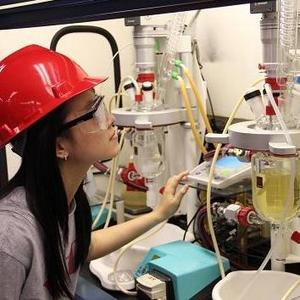Worcester Polytechnic uses Syrris technology to teach biodiesel

Photo: Syrris
July 16, 2013
BY Ron Kotrba
Chemical engineering students at Worcester Polytechnic University in Massachusetts have been investigating biodiesel production using the Globe jacketed reactor system from Syrris. “As part of their senior thesis, some of our undergraduate students suggested a green experiment, converting vegetable oil into biodiesel,” said Prof. William Clark from the university’s chemical engineering department. “This base-catalyzed process uses methanol and potassium hydroxide, which is not that simple a reaction or particularly safe. To implement this process in an undergraduate teaching laboratory, we needed a computer-controlled mini pilot plant that could run the reaction safely at different temperatures—the Globe system was ideal.”
Clark said Globe enables the biodiesel reaction to be performed under computer control, eliminating manual transfer of reagents and allowing the experiment to be carried out safely, which is paramount.
“Working with Syrris, we designed a small chemical factory,” Clark said. “Two Globe reactors and a Globe Reactor Master Module—enabling the integration of balances, pumps, temperature probes, stirrers, a temperature bath and a pH meter—controlled by Globe Reactor Master Software. The catalyst, potassium hydroxide in methanol, is generated at a controlled temperature in the first reactor, and then pumped across to a second reactor containing heated vegetable oil to start the biodiesel process. The software is very easy to use and controls the entire process,” a big advantage Clark said, as additional programs do not have to be written to control other integrated modules.
The software also provides an audit trail.
Advertisement
“This set-up has proved very reliable, and the temperature control is phenomenal,” Clark said.
Advertisement
Related Stories
Biodiesel capacity in the U.S. and Canada dipped slightly stable in 2024, with several renewable diesel producers reporting headwinds and lower margins alongside a drove of SAF projects in various stages of development.
The IEA’s Task 39 group has new research regarding the development and status of the sustainable aviation fuel industry.
The U.S. EPA on Nov. 16 released updated RIN data, reporting that nearly 2.11 billion RINs were generated under the RFS in October, up from 1.81 billion generated during the same month of last year.
Conestoga to host SAFFiRE cellulosic ethanol pilot plant
Conestoga Energy and SAFFiRE Renewables LLC announced on Nov. 16 their agreement for Conestoga to host SAFFiRE’s cellulosic ethanol pilot plant at Conestoga’s Arkalon Energy ethanol facility in Liberal, Kansas.
Officials at Calumet Specialty Products Partners L.P. discussed the company’s proposed plans to boost sustainable aviation fuel (SAF) production at its Montana Renewables biorefinery during third quarter earnings call, held Nov. 9.
Upcoming Events










